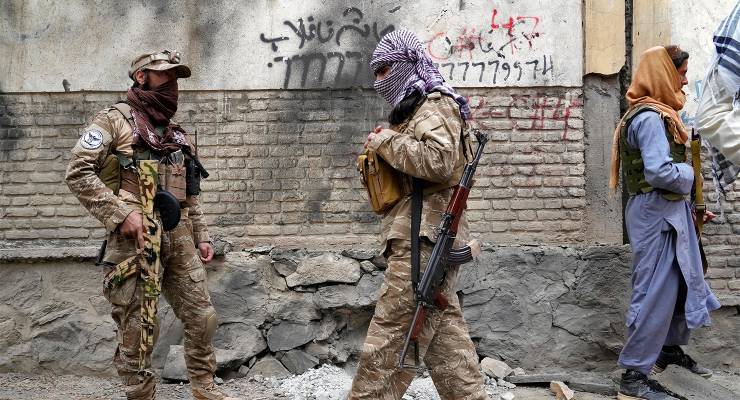
I returned to Afghanistan this week, almost one year after the withdrawal of the US military cleared the way for the Taliban’s victory. I wanted to see for myself what had become of the country since I flew out of Kabul on August 15 2021, hours before the Islamists began what many residents now refer to as a “reign of terror”.
I was in the north of Afghanistan when the US invaded in the wake of the 9/11 terrorist attacks and in Kabul when the Taliban returned 20 years later. In between, I spent many years as a resident correspondent.
I left Afghanistan today after three days of cat-and-mouse with Taliban intelligence agents, who detained, abused and threatened me and forced me to issue a barely literate retraction of reports they said had broken their laws and offended Afghan culture. If I did not, they said, they’d send me to jail. At one point, they surrounded me and demanded I accompany them to prison. Throughout, a man with a gun was never far away.
Far from achieving their goal of intimidating and undermining me, they showed me what I went to find — their true face. Their brutality, arrogance and lack of humanity. Their self-righteousness, intolerance and misogyny. Their incompetence and their utter lack of ability to rule. Afghanistan has fallen prey to terrorists who have not made and cannot make the transition from fighting force to governing body.
Everywhere I went in the short time I was in Kabul, people told me of their fear, their loss, their disgust, their desperation. Most have no jobs, no money, no hope for their future or the future of their children. What I found was a violent peace. People are arbitrarily detained, disappeared, interrogated, beaten, killed. It could be for any reason or no reason they will ever know. The Taliban are pitting neighbour against neighbour, encouraging people to spy on and report each other. Fear is digging in, and it’s here for the long haul.
The men in charge are violent men, proud of their violence. Foreign ministry spokesman Abdul Qahar Balkhi, who spent years living in New Zealand, called me a “white supremacist colonialist” and threatened me with violence by reminding me of a 2016 Taliban attack on a local television station after it carried a false report and refused to retract it. “We are proud of that,” Balkhi said. I told him that innocent people had been killed in the suicide attack on a bus taking employees home. “And we are proud of that,” he said. I told him a friend of mine was among the dead. “And we are proud of that,” he repeated.
I was told that articles I had written for Foreign Policy were fantasies, lies, concocted, and that my sources did not exist. And if the stories were true and the sources did exist, I was ordered to hand over all their names and details, as well as notes, photos, voice recordings and video.
“There are no gays in Afghanistan,” I was told by one of the intelligence agents who came for me, who refused to tell me his name. His fellow agent, Ahmad Zaheel, told me that if he learnt anyone was gay: “I will kill them.” The terrorists and extremists took umbrage at being referred to as terrorists and extremists.
“What is extremist?” I was asked. “You say there are no gays in Afghanistan — that seems to be quite an extremist point of view,” I countered.
When I asked what laws I’d broken, they told me, in a mix of Orwell and Kafka: “You know.” They’d look at each other, narrow their eyes, jut their chins, and say: “She knows.”
On the way to the headquarters of the intelligence agency, Zaheel showed me photographs of his two young daughters. Once there, they gave me tea, offered me candy, talked about their pets, asked me about my personal life, and even helped me plug in my phone charger. Only once did Zaheel try to take my phone, and that was when I tried to take his photo.
Throughout my detention, I was monitored by Australian diplomats and my colleague Massoud Hossaini on a WhatsApp group with location monitoring. I live-texted the entire four hours with them and my editors at Foreign Policy. So they accused me of being an “agent”. For whom? “You know.”
A report on the forced marriage practices of Taliban militants as they took over rural districts on their road to victory was just as odious to them as the report on LGBTQ people in Afghanistan. Sex was the prevailing theme of their anger.
When it came to my forced confession that I’d made it all up, I told them: “In all sincerity, hand on heart, this isn’t a good idea. It will make you look silly.” They didn’t care. They concocted the tweet, sent it to an unnamed boss to be tweaked and perfected, and then I tweeted it. They decided they didn’t like it, I deleted it, they edited it, and I tweeted again.
I won’t be back in Afghanistan any more. Neither will most other Western journalists, many of whom have also been harried, hassled and hustled away this week. Afghanistan’s once-proud independent media is no more, and now there’s nobody else. The country is descending into a hellscape of terror, hunger and poverty.
But who will tell the story?
After my tweet saga, they took a video confession. We did that twice, too, because I wrapped my headscarf around my neck like a noose as I said: “I haven’t been coerced.” We had a laugh, did it again, had some more tea, and then they drove me back to my guesthouse.
“You are now free to stay. You can go anywhere in the country — we will help you,” they said. I asked for a helicopter to Panjshir, the cockpit of armed resistance to the Taliban government, where reports of fierce fighting and terrible retribution against locals have been surfacing for months. Maybe not there, they said. And anyway, they didn’t have access to a chopper.
I settled for a plane. And left the place. But I won’t stop watching. Or caring.









What an absolutely fascinating piece Lynne.
As I read through it, different thoughts passed through my mind.
Firstly, I must say that I admire the bravery that you displayed by even venturing into such a country in the first place. I would never dare go anywhere near Afghanistan. I think that I would rather go to Mars.
From your comments it is clear that many of the locals are very dissatisfied with the Taliban. What I find difficult to understand is why, after 20 years of foreign military intervention (the consequences of which were not always something to be proud of), the more moderate forces in the country were not able to use this time and opportunity to establish a stronger foothold on power and thus prevent the return of this autocratic and theocratic group. Then again, the same thing happened after the Soviet Union pulled out of the country. The Taliban is truly something from the Dark Ages.
It is interesting too, that the Taliban are enemies with ISIS which, if you can imagine it, seem to be even worse than they are. Islam certainly has a long way to go.
“Islam certainly has a long way to go.” – yeah, not like our inclusive, liberal, tolerant Christianity … oh, wait
Luckily though, we’re not ruled by the clergy.
We came close though with that last PM.
roberto are you seriously attempting to compare life in Australia with life in Afghanistan? “oh wait!” What sort of point are you trying to make?
Don’t play cultural relativism. What is happening in the US is bad, but they have the tools to fight it, and many who do not agree with it. Violence against gay people and women is endemic in many Islamic countries. It is a problem and Islam does have to deal with it. Just last week there was a post on LinkedIn posted by LinkedIn about Pride Week. The comments under it from Muslims went beyond homophobia into violence and threats. And there were many of them. There is no point denying that there are attitudes held by some Muslims that are not compatible with liberal democracies.
Compare Taliban with the Proud Boys and the Oath Defenders.
Can you see any daylight between their reliance on violence, racism, sexism, homophobia and intimidation backed up by guns and brutality and a fundamentalist interpretation of their religion? The disparagement of anyone with an education and the deliberate with holding of education for women?
Their willingness to hold and run a covert revolution or not so covert revolutionary attacks, based upon their religious beliefs and their basic disregard for human life?
All Australians should be very wary of any conspiracy theory, religion or sect of Christianity which is/ are fundamentalist in nature and inflexible in attitude.
There is nothing more dangerous than the religious zealot..
Courageous reporting Lynne. Hats off to you. Heads bowed in sorrow for the average Afghani.
Afghanistan fell apart, and continues to fall apart, because of pretty much wall to wall corruption. From top to bottom, from border to border. Its a way of life and its brutally destructive. The victims are all of those who are powerless to participate in the corruption, which includes all the women.
A lesson for the rest of us.
Thank you for this article and the courage you showed in the face of terror. We in the West think we are immune to so-called theocratic rule by extremists but it’s only a short ride from here to there. Our democracy such as it is needs to be protected. We don’t want to be complacent and say “it couldn’t happen here”. Extremist christians are just as terrifying.
Hmmm.
Australia Invaded Afghanistan and sent in Ben Roberts-Smith – who is accused by his own colleagues accuse of murdering civilians. How much time has this journalist spent inVestigating these war crimes I wonder?
Is it any wonder Afghans are suspicious of Australian ‘journalists’?